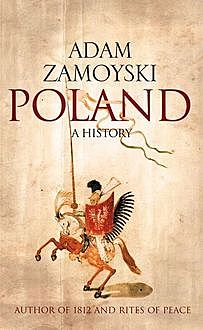
Read in our apps:
iOS
·Android
Poland: A history
- Anastasia Kasimovahas quoted7 years agothe sixteenth century the Polish Commonwealth was the largest state in Europe, extending over 990,000 square kilometres. The nature of this vast expanse varied from the undulating landscape of Wielkopolska to the flatness of Mazovia and the dense forests of Lithuania, from the Tatra mountains to the swamps of Belorussia, from the forests and lakes of Mazuria to the wild plains of Podolia rolling away into the distance, which the Poles referred to as ‘Ukraina’, meaning ‘margin’ or ‘edge’.
- Anastasia Kasimovahas quoted7 years agoSejms of both countries should meet as one, at Warsaw, a small town conveniently placed for the purpose
- Anastasia Kasimovahas quoted7 years agowe swear to each other, in our name and in that of our descendants for ever more, on our honour, our faith, our love and our consciences, that albeit we are dissidentes in religione, we will keep the peace between ourselves, and that we will not, for the sake of our various faith and difference of church, either shed blood or confiscate property, deny favour, imprison or banish, and that furthermore we will not aid or abet any power or office which strives to this in any way whatsoever…
- Anastasia Kasimovahas quoted7 years agothe absence of pomp and ceremony from its rites made it a pleasingly cheap religion to support.
- Armando Molinahas quoted8 years agos abandoned by most of Europe after 1945, as one country after another divested itself of its national pretensions and imperial attributes to pool its sovereignty in the interests of a united Europe. But the Soviet Union remained wedded to the old mindset of paranoid nationalist/ideological struggle for dominance. Its implosion released the nations
- Armando Molinahas quoted8 years agoempires, commonwealths, kingdoms, duchies, principalities, republics, bishoprics, city states, baronies and lesser sovereignties. In a process that began with the eighteenth-century partitions of Poland, these polities had been subjugated and then reorganised into a small number of highly competitive states and the peoples inhabiting them into largely fictitious nations which saw their survival in Darwinian terms. This initiated a struggle that culminated in the two world wars and the Cold W
fb2epub
Drag & drop your files
(not more than 5 at once)

